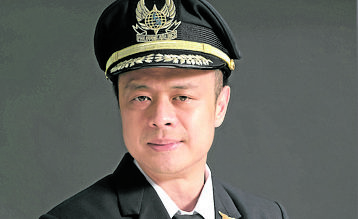PAL names new COO to lead carrier into recovery
Philippine Airlines (PAL), the region’s oldest carrier, emerged from the US Chapter 11 bankruptcy process with a fresh lease on life and a new president to lead it into recovery.
PAL officially announced on Monday that its senior vice president for airline operations, Capt. Stanley Ng, will move up as its new president and chief operating officer (COO).
Ng, a son-in-law of billionaire and PAL owner Lucio Tan, also makes history as the flag carrier’s first pilot to hold the top management post at PAL. Ng will be serving in an officer in charge capacity, the statement showed.
He replaces Gilbert Santa Maria, the PAL president who helped steer the flag career through the tumultuous COVID-19 pandemic until its successful exit from bankruptcy protection at the end of 2021.
Ng, who is in his mid-40s, said he would prioritize the country’s transport infrastructure buildup and sustainable development. For him, gaining the flying public’s trust comes ahead of the bottom line.
“Giving back to the Philippines, giving back to the society—that’s really my purpose, not really trying to make a profit, a lot of profit out of PAL, but it’s really more of the purpose to continue providing the best service the Filipinos deserve,” Ng said in a statement.
Ng has been in PAL since 2003 and worked his way up from a role in on-ground operations. He then started his career in the skies at the PAL Aviation School before continuing his training at the Airbus Training Center in Toulouse, France.
According to the statement, this was a turning point for Ng, who was “bent on becoming the best pilot in PAL.”
He eventually became first officer for Airbus Narrowbody in 2008-2009 and chief pilot for Airbus Narrowbody from 2018 to 2019.
“From check-in to passenger boarding, I was exposed to everything that went on at the airport. It helped me understand the problems that the airline staff and customers would encounter,” Ng said.
Apart from flying, his interests were consistently rooted in operational efficiency and safety.
In 2019, he played a key role in the dialogue with air traffic controllers to improve the on-time performance (OTP) of planes flying to and from Manila.
During this period, PAL recorded “an all-time high OTP rating of 92 percent in October, and consistent OTPs of 80 percent, 82 percent and 89 percent for the months of July to September, respectively.”
Even during PAL’s brief stay under Chapter 11, Ng was said to have been deeply involved in boosting operations and safety.
“So, we’re able to actually perform well. In terms of operational safety, our standards are really high,” he said.
Ng completed the Advanced Management Program at Harvard Business School.
“I discovered a lot about my purpose while taking the management program at Harvard. I realized there is confidence in experience and strength in humility,” he said. “That’s the kind of leadership I’d like to bring in PAL.”
In the statement, PAL said Ng was a “unifying leader amid the enormous challenges the pandemic continues to bring.”
“Capt. Stanley is supported by the existing management team, which will remain intact as the company maintains its momentum toward full recovery,” PAL said.
Ng’s appointment to the top post came amid rumors over the weekend that Santa Maria was on the way out.
Santa Maria, who became president of PAL after a major management shakeup in 2019, was instrumental in maneuvering PAL through its financial troubles over the past two years of the pandemic.
This principally involved PAL’s creditor protection filing in the United States that removed $2.1 billion in aircraft-related debts.
Before this, PAL’s plan of reorganization was approved by the US court after it won overwhelming support from its creditors, including aircraft leasing firms, suppliers and major banks.
Apart from cutting debts, PAL committed to streamline its business and return over 20 planes, cutting its fleet to 70 aircraft.
It earlier slashed a third of its workforce, or more than 2,000 employees, and suspended long-term debt payments beginning April 2020 after being forced into survival mode due to the pandemic.
Throughout the restructuring, the Tan family committed to $505 million in debt and equity capital infusions to support the flag carrier. PAL said in the statement it has the option to obtain up to $150 million in “additional financing from new investors.”

